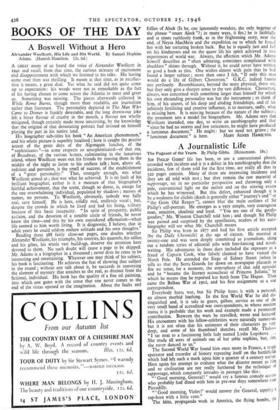BOOKS OF THE DAY
A Boswell Without a Hero
Alexander Woolleott, His Life and His World. By Samuel Hopkins Adams. (Hamish Hamilton. 12s. 6d.)
A GREAT many of us heard the voice of Alexander Woollcott in 1941 and recall, from that time, the curious mixture of excitement
and disappointment with which we listened to his talks. His having come over then was thrilling. It meant at that time, as in recollec- tion it means, a great deal. Yet what he said did not quite come up to expectation : his words were not as remarkable as the fact of his having chosen to come across the Atlantic to meet and greet us. Something was missing. The pieces afterwards collected in
While Rome Burns, though more than readable, are journalism rather than literature. The personality depicted in The Man Who Came to Dinner is frankly detestable, and the long drawn-out joke
left a bitter flavour of cruelty in the mouth, a flavour not wholly mitigated, though certainly made more interesting, by the knowledge that the original of that devastating portrait had insisted on himself playing the part in his native land.
His biographer sub-titles his book " An American phenomenon," and his whole picture is superbly localised ; here is caught the precise accent of the great days of the Algonquin lunches, of the " sophisticates "—in some respects so unsophisticated—of that era, of Broadway, of the various homes, culminating in the luxurious island, where Woollcott wore out his friends by rousing them in the middle of the night to listen to his endless talk ' • here, above all, redolent and pervasive, is the smell of success, of the establishment of a " great personality." That, strangely enough, was what Woollcott aimed at ; that was what he achieved. It is no fault of his brilliant biographer, rather is it a measure of that biographer's faithful achievement, that the scene, though so dense, is, except for the one overwhelming individual, populated by shadows ; masses of names, no persons. To Woollcott, obviously, nobody was fully real, save himself. He is here, solidly real, endlessly vocal ; but, despite the crowds in which he lived and had his being, solitary because of this basic incapacity. " In spite of prosperity, public acclaim, and the devotion of a notable circle of friends, he never knew the time—and this by his own considered affirmation—when life seemed to him worth living. It is diagnostic, I believe, that in adult years he could seldom endure solitude and his own thoughts."
Reading these 388 fairly close-set pages, one doubts whether Alexander Woollcott, his triumphs, his coteries, his quarrels, his sallies and his gibes, his whole vast build-up, deserve the attention here devoted to them. No such doubt will cause a page to be skipped. Mr. Adams is a biographer in a thousand ; never does he cease to be interesting and entertaining. Whatever one may think of his subject, his book is fascinating. He achieves the feat of showing that subject in the round ; without any talk about it, he succeeds in conveying the element of mystery that attaches to the real, as distinct from the fictional, individual. His book has the quality of a fine oil painting, into which one gazes with the sense that one never comes to the end of the vistas opened to the imagination. About the faults and
fdllies of Aleck (Is he, one ignorantly wonders, the only begetter of the phrase " smart deck "?; in many ways, it fits.) he is faithfully and at times ruthlessly frank, as in the frightening story, near the end, of Neysa MacMein and the expedition on to which he forced her with her torturing broken back. But he is equally just and full on his kindnesses and on the queer lift his spirit achieved in two experiences of world war. Always, the affection which Mr. Adams himself describes as " often admiring, sometimes complicated with shudders " shines through. Without it, he could never have written so good a book as this. One wishes almost with pain that he had found a larger subject ; more than once I felt, " If only this man would do a life of Gilbert Chesterton." G.K.C. indeed haunts one perilously. Resemblances, beyond the mere physical, there are, but they only give a sharper sense to the vast difference. Chesterton, always, was concerned with something larger than himself for which his own abounding personality was but the instrument ; to think of him, of his causes, of his deep and abiding friendships, and of his infinitely .fertilising and creative influence, is to measure, sadly, what is missing here. It is missing because of the nature of the subject ; the treatment sets a model for biographers. Mr. Adams says that Woollcott intended, one day, to write an autobiography and that " since he had no secrets and few reticences, he might have produced a luminous document." He might: but we need not grieve ; the






























 Previous page
Previous page